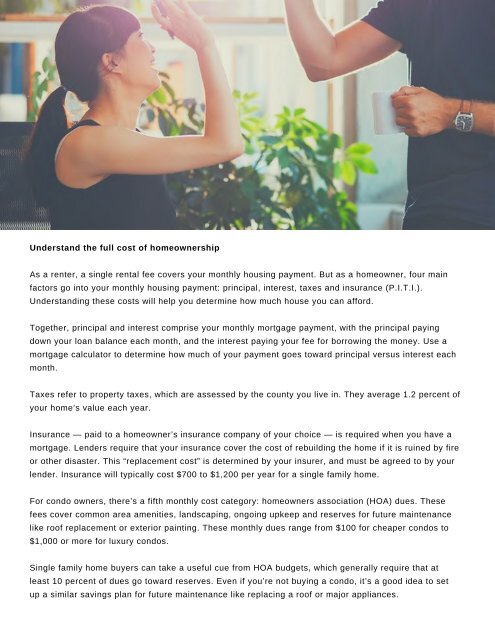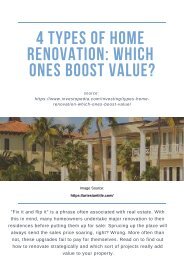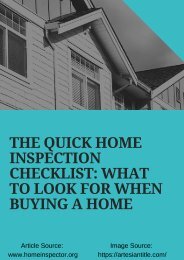Renters_ Are You Ready to Buy a Home_
You also want an ePaper? Increase the reach of your titles
YUMPU automatically turns print PDFs into web optimized ePapers that Google loves.
Understand the full cost of homeownership<br />
As a renter, a single rental fee covers your monthly housing payment. But as a homeowner, four main<br />
fac<strong>to</strong>rs go in<strong>to</strong> your monthly housing payment: principal, interest, taxes and insurance (P.I.T.I.).<br />
Understanding these costs will help you determine how much house you can afford.<br />
Together, principal and interest comprise your monthly mortgage payment, with the principal paying<br />
down your loan balance each month, and the interest paying your fee for borrowing the money. Use a<br />
mortgage calcula<strong>to</strong>r <strong>to</strong> determine how much of your payment goes <strong>to</strong>ward principal versus interest each<br />
month.<br />
Taxes refer <strong>to</strong> property taxes, which are assessed by the county you live in. They average 1.2 percent of<br />
your home’s value each year.<br />
Insurance — paid <strong>to</strong> a homeowner’s insurance company of your choice — is required when you have a<br />
mortgage. Lenders require that your insurance cover the cost of rebuilding the home if it is ruined by fire<br />
or other disaster. This “replacement cost” is determined by your insurer, and must be agreed <strong>to</strong> by your<br />
lender. Insurance will typically cost $700 <strong>to</strong> $1,200 per year for a single family home.<br />
For condo owners, there’s a fifth monthly cost category: homeowners association (HOA) dues. These<br />
fees cover common area amenities, landscaping, ongoing upkeep and reserves for future maintenance<br />
like roof replacement or exterior painting. These monthly dues range from $100 for cheaper condos <strong>to</strong><br />
$1,000 or more for luxury condos.<br />
Single family home buyers can take a useful cue from HOA budgets, which generally require that at<br />
least 10 percent of dues go <strong>to</strong>ward reserves. Even if you’re not buying a condo, it’s a good idea <strong>to</strong> set<br />
up a similar savings plan for future maintenance like replacing a roof or major appliances.


















